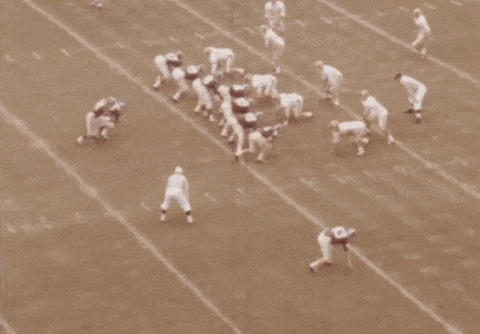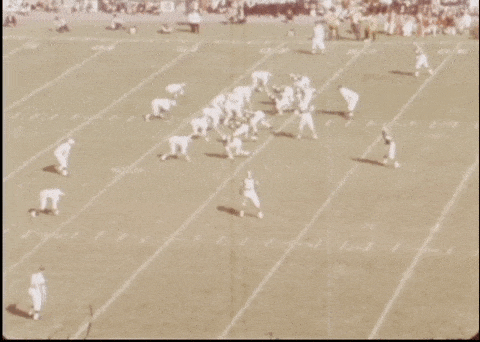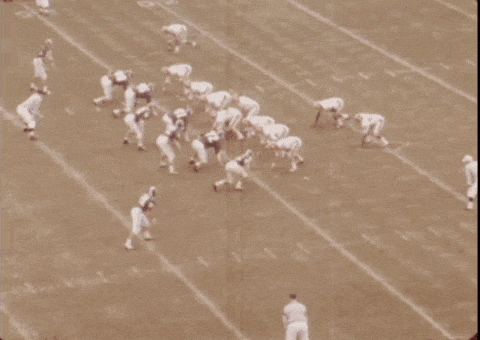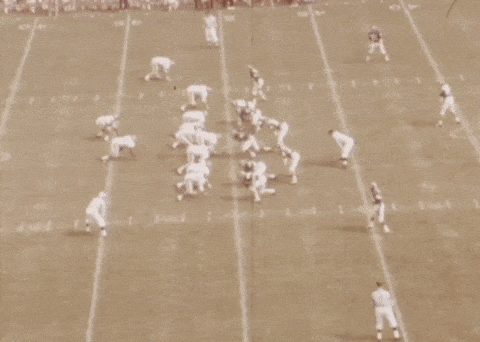The University of Houston defeated two-time defending national champ Michigan State, 37-7, on September 23, 1967. It was the game that put UH football on the national map.
Houston head coach Bill Yeoman worked at Michigan State from 1954-1961, and the 1967 trip was his first time facing his former boss, legendary MSU coach Duffy Daugherty. But the game wasn’t just a big deal for Yeoman. In the months before traveling to East Lansing, some UH players joked that the game was vital because it was for the Beaumont City Championship. UH and Michigan State each had four players from Beaumont high schools.
UH led the defensive battle, 10-7, at the half. GoCoogs.com subscriber and UH great Phil Woodring sacked MSU QB Jimmy Raye to help keep UH in control of the game:

The Coogs forced Michigan State to punt on their opening series after the half. On UH’s second offensive play, QB Dick Woodall called 323 quick “L” post for split end Ken Hebert.

Hebert cut across the field, catching the pass and leaving the defensive back flat-footed. As the DB caught up, tight end Bob Long came across the field and eliminated him from the play. Hebert eluded two more defenders before scoring from 77 yards out. Hebert was the nation’s leading scorer in 1966 and caught two TDs against Sparty (one from Woodall, one from Ken Bailey).
Woodall only completed three passes that day, but two went for long scores. The other went to flanker Don Bean on a play called 323 Strong:

“Bean just ran straight down the field, past a guy he’d been outrunning since grade school,” he recalled in an interview with me 31 years later. Bean was one of the Cougars playing for that Beaumont City Championship.
But that day’s star was Warren McVea, who had a personal motivation going into the game.
“I kind of got a grudge for this game,” UH running back Warren McVea said. “I’ve been hearing about what the Spartans are gonna do to us. Then I got a letter from (Michigan State player Tody Smith) last week asking me if I was ready to come up for the killing.”
Wonderous Warren put on a clinic, running for 155 yards on 14 carries. He scored UH’s only first-half TD, again earning his nickname Mack the Knife. McVea took the handoff, went right, waited for his blockers, then cut through the Sparty defense, well, like a knife:

Consensus All-American Rich Stotter (#67) pulled from the left guard spot to block, but McVea did most of the work, using his vision and power to slip tacklers.
“He’s the best back I’ve ever seen,” Michigan State DB Drake Garrett said after the game. “His moves…you don’t know what he’ll do next. He’s there…and then he’s not.”
“McVea was a lot stronger in his legs than anybody thought,” Yeoman said. “He would run down the field, set up his blocks, and then he was gone. Maybe three guys got their hands on him. He was quick as a gnat and had tremendous strength.”
The game between the upstart Veer and the national champs brought heavyweight writers from across the country. Dan Jenkins memorialized the game in Sports Illustrated, saying that “Houston showed up with last week was a gang of the speediest athletes this side of a bobsled run.”
Jenkins also said, “Michigan State could have played blunderless football all afternoon and not overcome Houston’s speed.”
Sports Editor Dan Cook of the San Antonio Express and News said of Yeoman, “The lamb killed the butcher, and the young student returned home to teach his old professor.”
Yeoman said that Michigan State was the most important win he’d had at UH because “that’s what mentally turned it all around for the student body. Because they knew Michigan State had a team, and our kids didn’t beat them gently.”
The Cougars came home with the Beaumont City Championship and the last laugh for McVea, who had a message for his friend Tody Smith.
“I want to talk to him about that killing.”
Michigan State media
The following video is cut from the Michigan State coaches’ game film. It does not have sound. Below it are photos, headlines, and stats from the game.





















